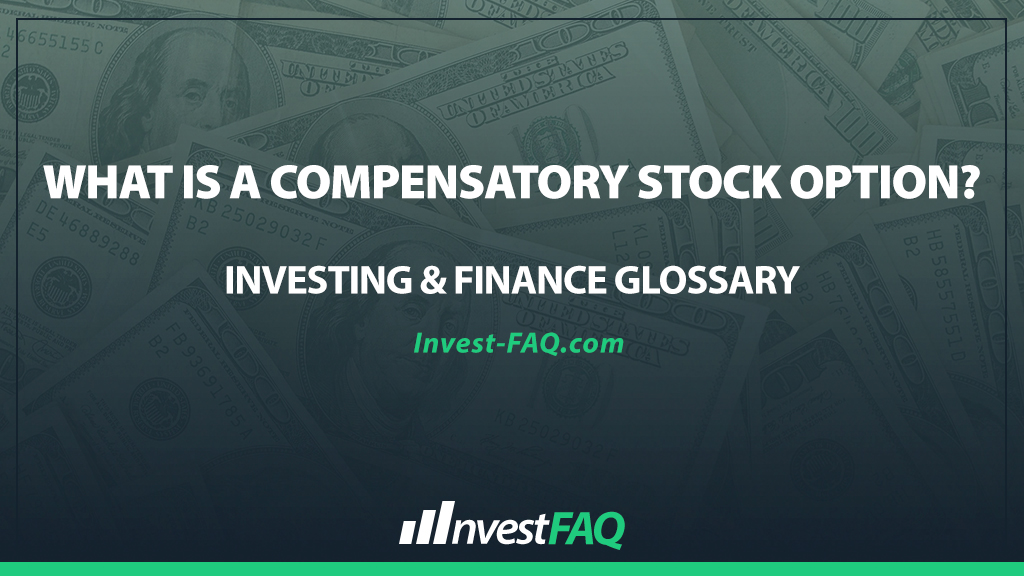
Compensatory Stock Option
Contents
A compensatory stock option is a form of employee compensation that grants the right to purchase the employer’s stock at a predetermined price for a specified period. It is designed to align employees’ interests with those of the company’s shareholders by providing an incentive for performance that enhances the company’s value.
Compensatory stock options are widely used in businesses as a tool for attracting, retaining, and motivating employees.
They are especially prevalent in startups and technology companies, where cash flow might be limited, and the potential for growth is significant.
These options serve as a non-cash incentive that can lead to substantial rewards for employees if the company’s stock value increases.
Example of a Compensatory Stock Option
“Tech Innovations Inc.” grants its CEO 10,000 stock options at an exercise price of $10 per share, valid for five years. This means the CEO can purchase up to 10,000 shares of the company’s stock at $10 each, regardless of the stock’s future market price, within the next five years.
Grant Date: January 1, 2021
Exercise Price: $10 per share
Number of Options: 10,000
Expiration Date: December 31, 2025
If the company’s stock price rises to $30 per share by 2023, the CEO could exercise the options to buy shares at $10 each and potentially sell them at the market price of $30, realizing a gain.
In the “Tech Innovations Inc.” scenario, the compensatory stock options act as a powerful motivation for the CEO to drive the company’s success, as personal financial benefits are directly tied to the company’s stock performance.
From an accounting perspective, the company must recognize the fair value of the stock options granted as an expense over the vesting period, reflecting the cost of employee services received in exchange for the stock options.
This process involves estimating the options’ fair value at the grant date, usually using an option-pricing model like the Black-Scholes formula.
Significance for Investing & Finance
The accounting for compensatory stock options is significant due to several reasons:
Expense Recognition: It ensures that the costs associated with granting stock options are accurately reflected in the company’s financial statements, impacting earnings and shareholders’ equity.
Motivation and Retention: By linking compensation to company performance, stock options help align employees’ efforts with corporate goals, fostering loyalty and long-term commitment.
Attracting Talent: The potential for significant financial rewards through stock options makes a company more attractive to high-caliber talent seeking opportunities in growth-oriented firms.
Compliance with Standards: Proper accounting for stock options is crucial for compliance with financial reporting standards, such as FASB ASC Topic 718, ensuring transparency and consistency in financial statements.
In summary, compensatory stock options are a strategic compensation tool that can drive alignment between employees’ performance and company success.
Accounting for these options ensures that their financial impact is accurately reflected in the company’s financial statements, supporting effective corporate governance, financial analysis, and strategic decision-making.
FAQ
What is a compensatory stock option?
A compensatory stock option is a form of equity compensation given to employees, executives, or directors as an incentive, granting them the right to purchase company stock at a predetermined price for a specific period.
How do compensatory stock options benefit employees?
Compensatory stock options provide employees with the opportunity to buy company stock at a lower price than the market value, offering potential financial gains if the company’s stock price increases.
Are there any tax implications for receiving compensatory stock options?
Yes, there are tax implications for receiving and exercising compensatory stock options, which can vary depending on the type of options issued (e.g., non-qualified stock options or incentive stock options) and the jurisdiction’s tax laws.
What is the difference between compensatory stock options and employee stock purchase plans (ESPPs)?
While compensatory stock options give employees the right to purchase stock at a set price after a vesting period, employee stock purchase plans (ESPPs) allow employees to buy company stock at a discount through payroll deductions, often without a vesting requirement.
